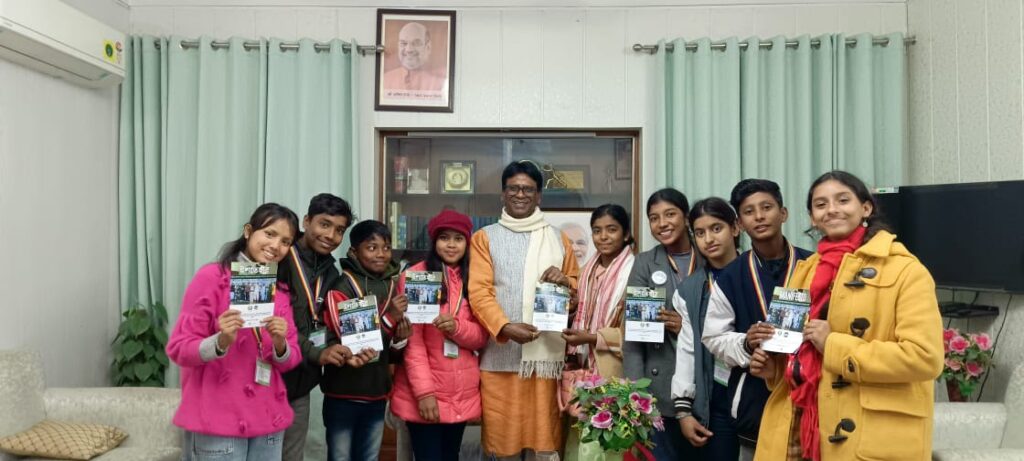Children representing 75 parliamentary constituencies from across the country gathered in the national capital and engaged with members of parliament and political parties in New Delhi to seek the adoption of their Children’s manifesto in the lead up to General Elections 2024.
“Nothing about children without children” echoed the sentiments of these young child parliamentarians during the National Inclusive Children’s Parliament (NICP),
that took place from January 24th to 31st, 2024. The event brought together over 100 young child leaders, 100 adult facilitators, and 100 directors of child rights organizations, uniting them to seek platforms for the genuine participation of children. The participants collectively sought to make India the first nation in the world to engage children genuinely and fully in the most sacred moment of a democracy, namely elections.
In the immersive week-long program, young citizens from different regions of the country actively engaged in various activities, ranging from comprehensive Child Rights training and in-depth sessions on United Nations Sustainable Development Goals (UNSDGs), Climate Change, and steps for advocacy.
Modeled after a genuine parliamentary structure, the NICP played a crucial role in amplifying the voices of children from marginalized and underprivileged backgrounds, providing them with a platform to shape their voices and address critical issues affecting them, including education, health, and safeguarding their fundamental rights. Children were also trained on the Theatre of the Oppressed as a medium of expression for advocacy.
Sharing her experience with climate change session, Ritu Kumari, a 16-year-old from the NINEISMINE Delhi said, “Children should have an active role in climate action, as they are the most disproportionately affected victims of the climate crisis and as the present and future generation, they deserve the right to live in a clean and safe environment.”
During the process, the child parliamentarians elected their national Prime Minister and other key leaders. Babita from Navjeevan Society, Chandigarh was elected as Prime Minister, with Kavita from Ceva, Delhi as Deputy Prime Minister and Salka from Ferrando Rehabilitation Society,Tripura (a child with hearing impairment) as an additional-honorary Deputy Prime Minister.
The Parliamentary Affairs Ministers elected are Durga from Telangana, Asina from Assam and Yashka from Tamil Nadu as Deputy Parliamentary Affairs Ministers and Salik as additional honorary Deputy Parliamentary Affairs Minister to represent voices from Jammu Kashmir. All other child members were assigned as Union, State and Additional Ministers based on each of the 17 UN Sustainable Development Goals and the campaign’s additional 18th goal called ‘ all rights for all children’.
Nikki and Robin from PRATYeK (Delhi) were appointed as the President and the Vice-President of the NICP. The parliament is a representation of diverse India, voicing the commitment of children to building an inclusive nation where no one is left behind.
These child parliamentarians were sworn in by former child Prime Minister Ms Swarnalaxmi Ravi, a person with complete visual impairment administered in the presence of Arham Ali Khan represting the Samajwadi Party, Ms Reena Gupta the representative from the Aam Admi Party and Mr Asfar Ali from Congress.
Babita Devi, a 16-year-old, and the newly elected Prime Minister of NCIP, shared her motivation, stating, “As the Prime Minister of the Federation of Children’s Parliament in Chandigarh, where we primarily focused on the education of children from slum communities and could bring change. I believe, now, as the Prime Minister of NICP, I can bring positive impacts on the lives of children across the country, as I truly believe in the power of children to make a difference.”
Ms Babita, in her inauguration speech promised to live up to the ideals represented by the NICP logo. Babita emphasized that she would work on creating an upside-down world where the most vulnerable will be her first priority. Babita addressed the gathering in Punjabi, her mother tongue to symbolize her call to listen to regional and diverse languages and voices. Also, children presented their manifesto in Tamil, Malayalam, Hindi, Urdu, Punjabi, Assamese, Kannada and Marathi to the dignitaries present.
Following their 7 Day annual parliament, the child parliamentarians interacted with the Dr. Rajkumar Ranjan Singh (Minister of State for External Affairs and Education) , Shri Chandra Shekhar Sahu (Biju Janta Dal), Shri Francisco Sardinha (former chief minister of Goa, Congress), Khogen Murmu (Member of Parlaiment, Bhartiya Janta Party) seeking the adoption of their children’s manifesto into their respective party manifestos.
Aashiq from Odisha, 15 years old, said, “Visiting Shri Chandra Shekhar Sahu, a Member of Parliament from Odisha, was my first-time experience. It was exciting to meet him as he was from my nearby town. Submitting our children’s manifesto to him made me feel more heard as a child. This opportunity was very encouraging and made me realize this is just the first step, and together as child rights advocates, we will keep striving for a better world for every child.”
Steve Rocha, the national convener of the NINEISMINE campaign said that, ‘The purpose of involving children in the world’s largest democratic exercise (namely General Elections was to ensure that India led the world in setting a non-negotiable standard of genuinely engaging children in all policy-making moments including elections. India through each of its elected representatives must be educated through this exercise to view children as active and engaged citizens of today – with meaningful experiences, realistic aspirations and unique recommendations, rather than citizens of the future.”
The focus of all the participants of the NICP 2024 in the upcoming months leading to the General Elections would be to gather one million voices of their peers in support of their Children’s Manifesto. The child-parliamentarians also vouched to engage all candidates and political parties contesting the upcoming general elections to seek the inclusion of their recommendations in all political manifestos.



